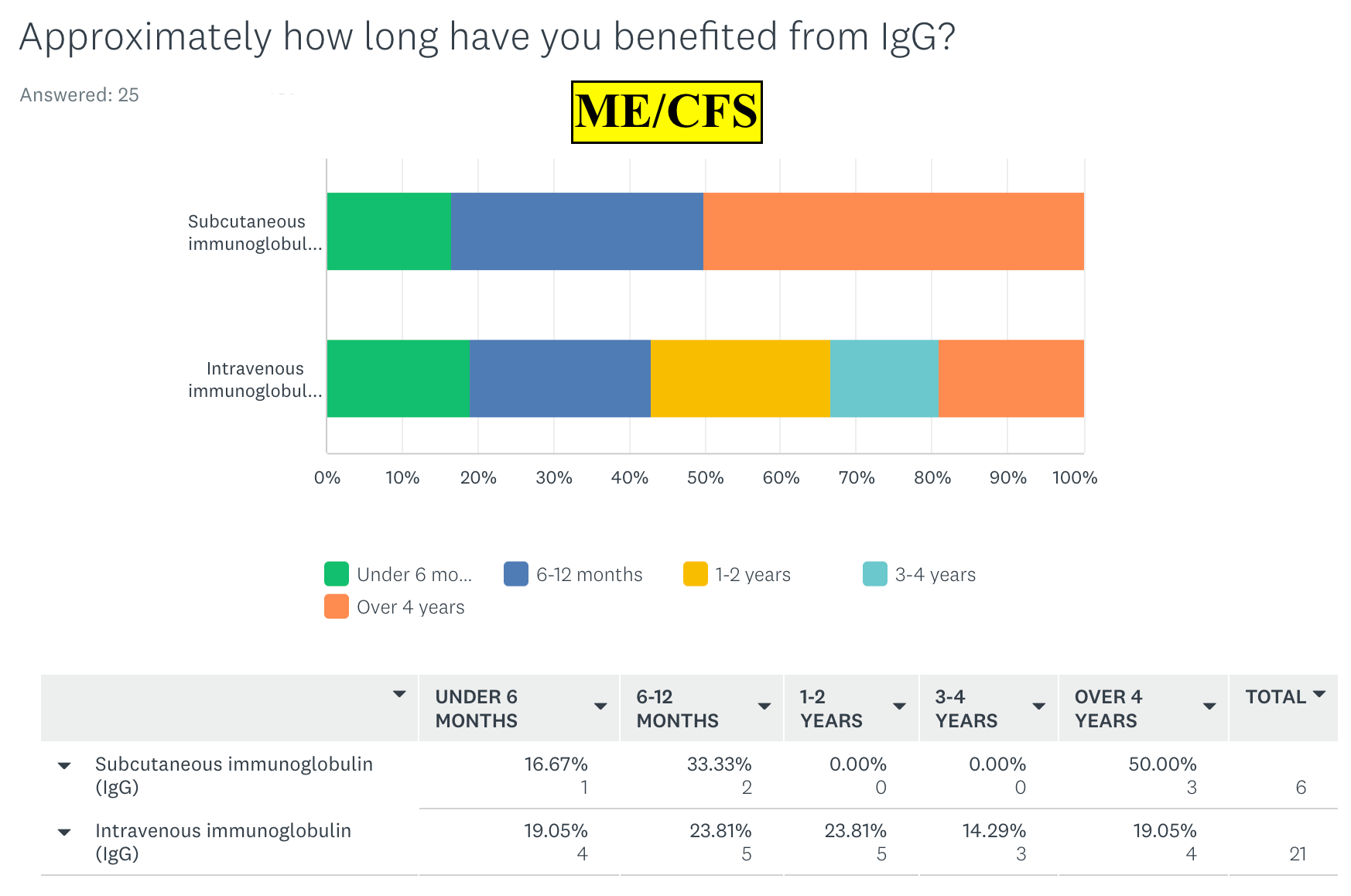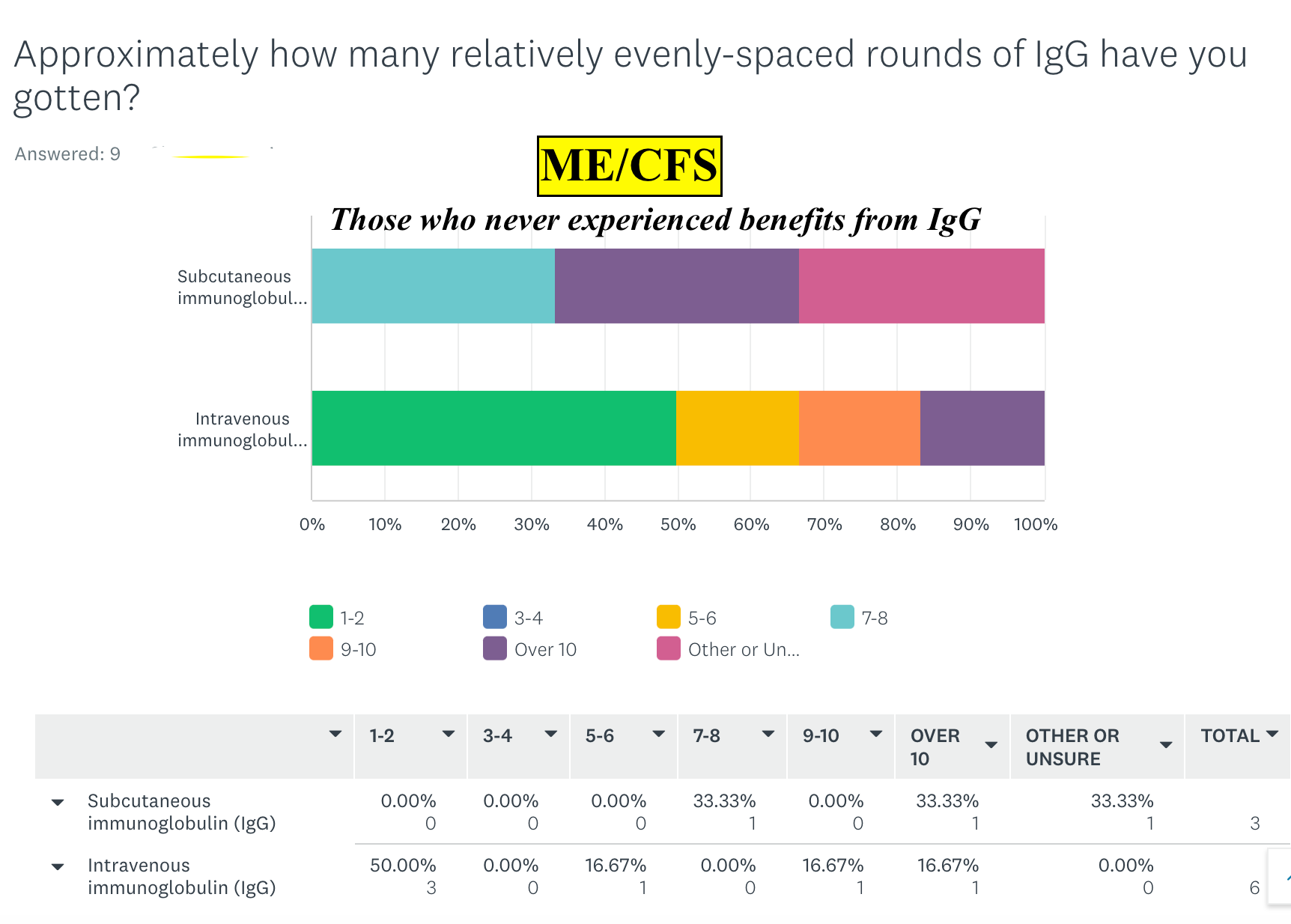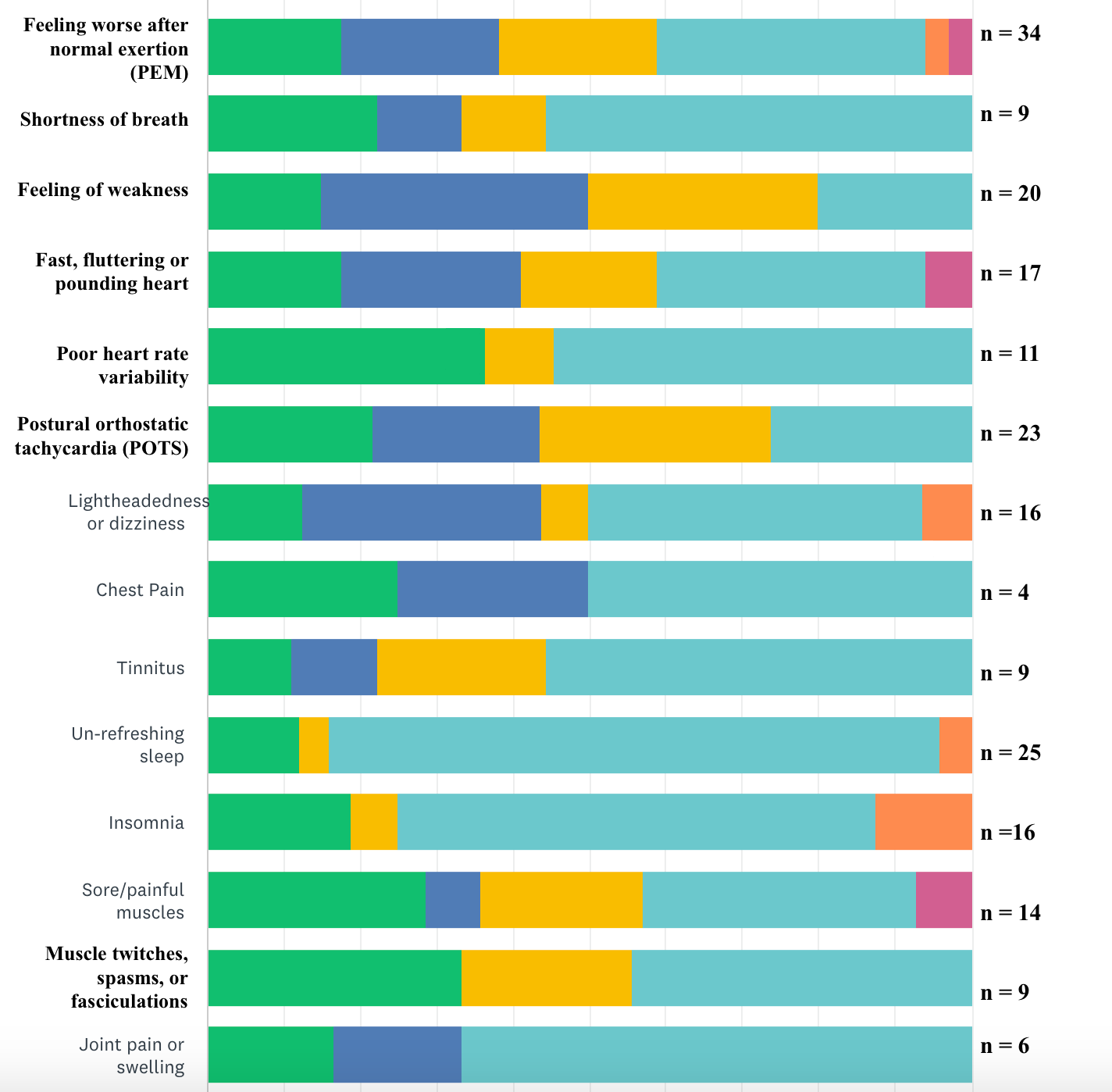Thank you to all who completed my recent TREAT ME survey! This is the second in a series of articles covering survey results on individual treatments. At a later date, a comprehensive overview of treatments with more general information will be shared. If you would like to support this volunteer project, please donate here.
This article focuses on IMMUNOGLOBULIN (IgG) therapy in ME/CFS respondents only. The sample size in Long COVID respondents was much too low to glean any info and I chose not to combine them with ME/CFS. However, if you are a Long COVID patient who suffers from ME/CFS symptoms or POTS, you may find this information relevant to you.
Overall the results look very promising. Unfortunately, due to high cost and barriers to access, many who improved were not able to continue therapy, and discontinuation caused a return of some or even most/all symptoms. See a few pertinent quotes from survey respondents below:
“It’s been the most effective long term treatment I’ve had so far. Unfortunately it’s very expensive and not reimbursed by insurance.”
“Both [IV and SC] seem to be equally effective, but the dosage is very important. Results did not last with a dosage below 10 g a month.”
“This is a difficult treatment to get, to be on, and to gain benefits from, but I have been on it for 5 years and it is a great contributor to my recovery…It took over 6 months to receive benefits, but I wouldn't be without it in my life.”
Now let us look into the results. I include a brief summary along with each chart.
OVERALL CONDITION
Over 81% on SCIG (n = 11) and 72% on IVIG (n=29) reported that their overall condition improved as a result of IgG therapy. Strikingly, more than 52% on immunoglobulin reported feeling moderately to much better, with over 27% of the 38 respondents feeling “much better.” Note that this is a large percentage compared to many other treatments surveyed — “slight” improvements tend to be reported more often.
TIME TO IMPROVEMENT
Responses varied substantially. 9 out of 25 (36%) respondents reported it took just 1 to 2 rounds of therapy before starting to feel better, while on the other extreme, 8 out of 25 (32%) respondents reported that over 10 rounds of IgG were required. Thus if IgG does not work right away, do not lose hope. If you can access, afford and tolerate IgG, it’s worth continuing for at least 10 rounds or more.
3. DURATION OF BENEFIT
Respondents who improved were asked how long they have benefited from IgG. Over 80% reported benefits lasting at least 6 months, with over 50% enjoying benefits for over a year. Around half were still continuing therapy at time of completion of this survey.
TREATMENT DURATION IN THOSE WHO DID NOT BENEFIT
Did the nine respondents who reported no benefits from IgG receive sufficient rounds of treatment? Hard to know for sure, but three received just 1-2 IVIG treatments, while only two received over 10 treatments. Recall that around 32% of those who improved reported that it took over 10 treatments until they noticed any benefits, so it is possible that some respondents who did not improve might have required further treatment.
SYMPTOM REBOUND UPON DISCONTINUATION
12 of 25 respondents were still taking immunoglobulin at the time of survey completion, leaving a small sample size of 13 who had discontinued therapy at some point. 13 of 13 reported that when they discontinued IVIG or SCIG therapy, some or all of their symptoms returned. This is especially distressing considering how challenging it is to access and afford IgG treatments. One respondent wrote, “treatment was unavailable for two months, all symptoms worse. [It took] six months to get back to normal after.”
EFFECTS ON SYMPTOMS
I asked those who reported benefits approximately how many of their symptoms significantly improved with immunoglobulin. Impressively, 6 in 25 (24%) reported that “most/all” symptoms significantly improved, while another 9 in 25 (36%) reported “quite a few.” This is unique compared to most other surveyed treatments where the majority of respondents reported that only one or a few symptoms significantly improved. (More comprehensive overview of treatments & results will be presented at a later date.)
INDIVIDUAL SYMPTOM IMPROVEMENT
Below are the symptoms that received at least 20 ratings. Respondents were only asked about symptoms that they had reported in the survey. Impressively, feeling of weakness improved in 80% (n = 20) while “brain fog” (n=28), POTS (n=23), fatigue (n=34) and PEM (n=34) improved in 79%, 73%, 72% & 59%, respectively. On the other hand, it was disappointing & quite surprising to see how few (less than 16%!) noticed improvements in unrefreshing sleep.
If you’re interested, you may glance over the chart below to see the effects reported on all symptoms surveyed, but please note that sample size varies widely from n = 1 to 34. Green = much better, dark blue = moderately better, yellow = slightly better, light blue = slightly worse, orange = moderately worse, and pink = much worse. Finally, any donations are appreciated and will help speed along this research project which I’ve been doing on a volunteer basis with ME/CFS myself. (I’d love to be able to afford immunoglobulin, especially after these survey results 😁!) Thank you!













My son has POTS, SIBO, MCAS and IBS. He was 6 feet 2 and 118 pounds when we started scIG. He couldn’t hold food down. We started over a year ago, and we coupled it with FMT (crapsulas). He now can be in school full time and weighs 170. He no longer meets criteria for POTS or MCAS since his symptoms have remitted.
This is fantastic and very helpful, thank you! Would you be so kind as to adding a reference to a scientific paper linking the value of IgG therapy with regard to COVID? So that I can show it to doctors as proof to ask for this therapy. Thanks ever so much for all the great stuff you do for this community!